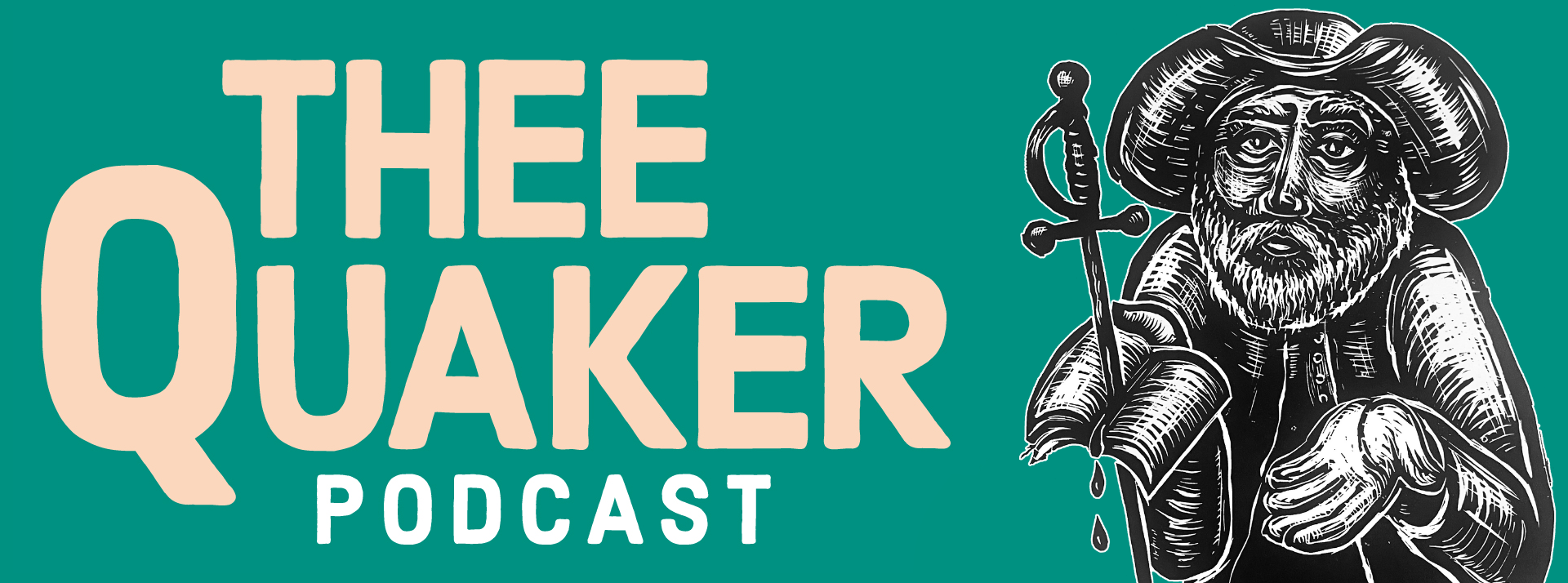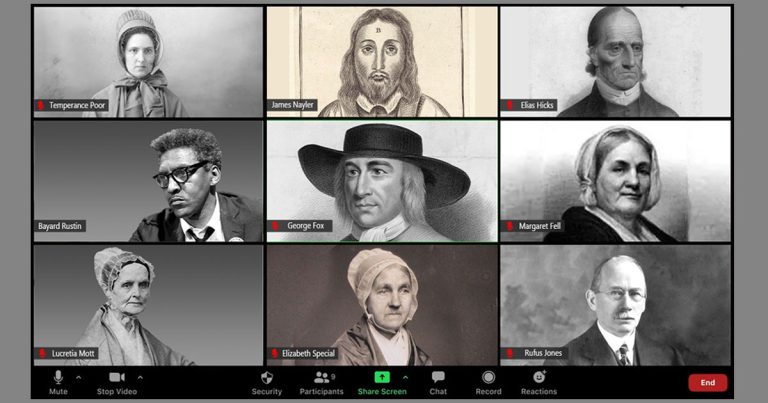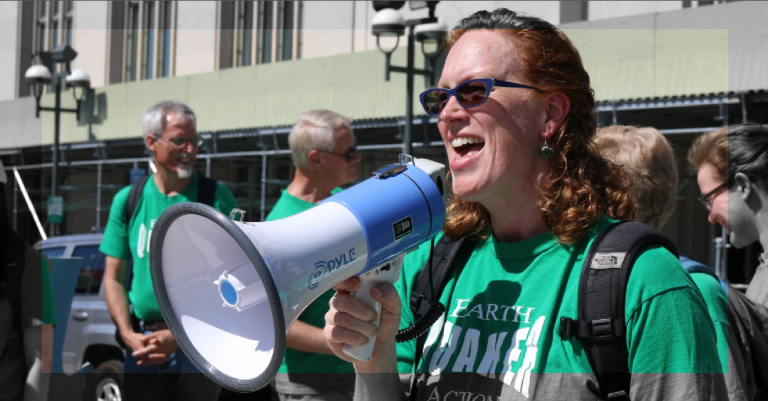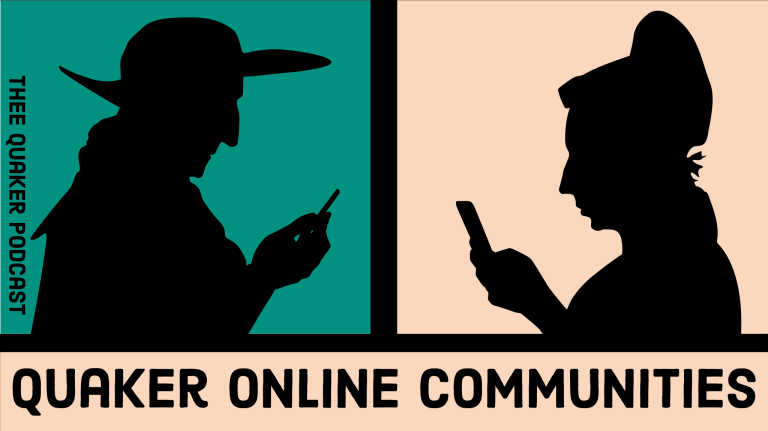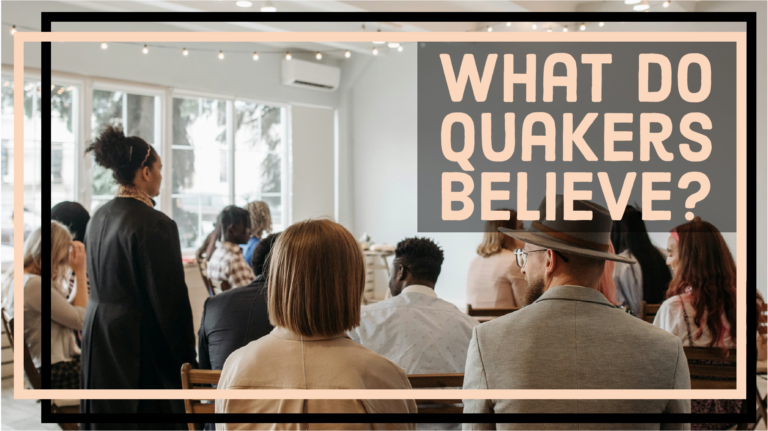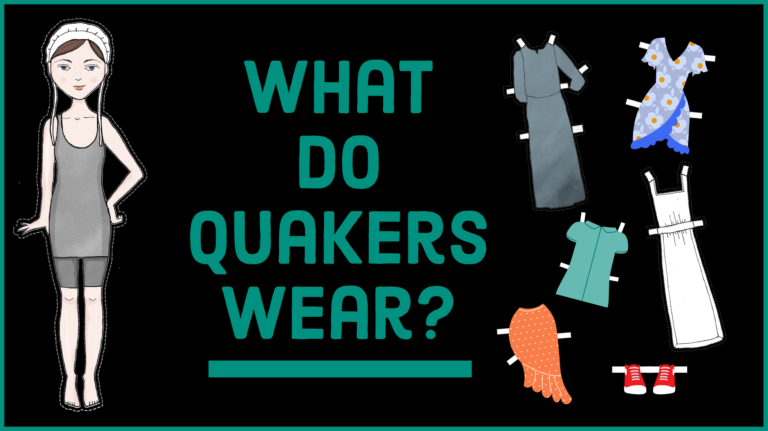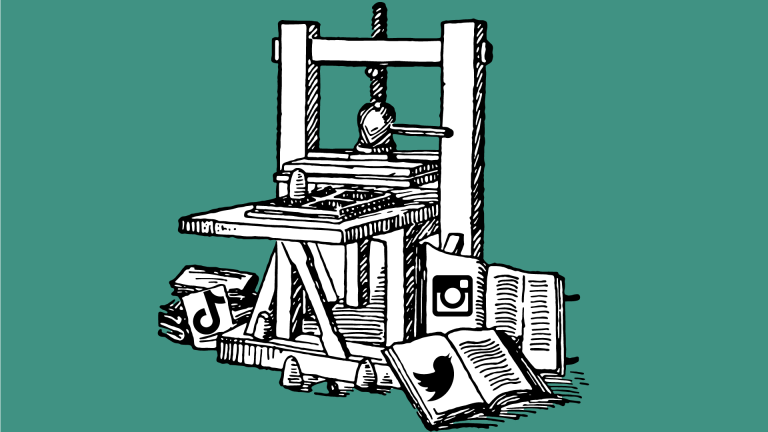Quakers Who Stand Up for Truth
Quakers have a long history of getting into trouble for the sake of justice, but what drives them to act? Why do some Quakers feel compelled to break the law, make public demonstrations, or disrupt business as usual? In this episode, we explore those questions through the story of Jane McCarthy, a 74-year-old grandmother with incurable cancer who is risking her home to protest her council’s investment in fossil fuels. We then travel back to the 17th century to uncover the urgent motivations of the first Quakers, who used disruptive and radical tactics in their quest to turn the world upside down.
Erica Canela’s forthcoming book: https://ericanela.co.uk/blog/zealous-a-darker-side-of-the-early-quakers/
Season 1 episode on James Naylor: https://quakerpodcast.com/james-nayler-the-quaker-who-rode-into-bristol/
Subscribe so you don’t miss an episode!
Leave a comment below to share your stories and thoughts!
This episode is brought to you by Olney Friends School. Located on a 350 acre campus in Barnesville Ohio, Olney Friends School is a leading Quaker day and boarding school that boasts a 3:1 student to teacher ratio and a 100% college acceptance rate. Since 1837, Olney has pioneered a progressive educational model that adapts to each student’s unique needs. Their flexible, project-based curriculum blends mastery learning with intellectual exploration, preparing diverse learners for college success and lifelong curiosity. To enroll your student or to learn more, visit olneyfriends.org.
- Early Quakers were often prosecuted for intentionally breaking the law and were seen by some as “bad neighbors”. How does this historical context challenge or inform your view of modern protesters who are arrested for their actions?
- Jane states, “I really, really want to hold on to love and resistance”. How do these two concepts work together in her story and in the broader idea of Quaker prophetic witness?
- The episode asks listeners to “find what is yours to do and do it faithfully”. After hearing these stories, what does that prompt mean to you in your own life? What is yours to do?
Jon Watts
Jon, Hi friends. It’s Jon here. Before we start today’s episode, I just wanted to hop on briefly to ask for your help. Making a show like this takes a lot of energy and resources, and while we’ve seen plenty of podcasts reach sustainability on crowdfunded platforms like Patreon, a lot of those shows are about conspiracy theories or pop culture or whatever. So this is kind of an experiment. Can a show about spiritual courage inspire enough support to become sustainable? Well, that’s up to you. If you go to Quakerpodcast.com and hit the support button right now and sign up for $10 or more a month, we’ll send you some swag. And it’s cool swag, a bona fide Benjamin Lay mug, stabbing a Bible with a sword and yelling, “smash this mug”. But even more importantly, you’ll be contributing to helping make this happen. The podcast that Quakerism deserves, high quality, well researched, powerful storytelling, authentic and intimate interviews, week after week. It’s free to download for anyone, whether they just discovered Quakerism or their lifelong friend, and you can help make it possible. So if you think that’s worth supporting, or you just want some cool swag, please head over right now and sign up. It just takes a few minutes. That’s Quakerpodcast.com, and hit support. Thank you so much for helping make it happen. Here’s the show,
Zack Jackson
I’m Zack Jackson
Jon Watts
and I’m Jon Watts,
Zack Jackson
and we want to welcome you to episode one of season three. I hope you are excited as I am, Jon.
Jon Watts
Yeah, this has been a long time in the works. The world has changed quite a bit since we wrapped up season two, and you know, we have been doing monthly episodes since then in the off season, but now we’re coming back in your feed. You’ll hear from us every Tuesday with a new episode starting right now. So what? What are we going to hear today?
Zack Jackson
yeah, yeah. So every season, we like to kind of center the episodes around a theme, and in particular, center them around a character that exemplifies that theme. And every episode does not hold to it 100% but we like to have a sort of unifying theme. And the phrase that kept coming up as we were doing preparation and planning, was Quaker prophetic witness. Now, you mentioned a little bit about this in the trailer that launched a couple of weeks ago, but for those who maybe didn’t listen to it or it’s been a few weeks, can you sort of help us understand what that phrase means a little
Jon Watts
Yeah, Quaker, Quaker spirituality has always been visionary. What could the world look like if we were acting closer in line with our spiritual beliefs, if we were listening deeply to that of God, that of love, that of the Spirit in ourselves and in each other? And when we look at the world around us right now, we see something really different. People are not listening to that of God in themselves and each other. They’re not acting out of love and abundance. And Quakers, throughout our nearly 400 year history have at times, felt the need to try and shake people awake, make everyone aware that a different way is possible, and this way that the culture and the society is going right now is not the way that it has to be.
Zack Jackson
So as we get started in this season about Quaker prophetic witness. I wanted to begin by telling you a story that came to my attention a few weeks ago. It’s about a 74 year old grandmother with incurable cancer, who, despite being unable to attend protests anymore, has found a way to take prophetic action anyway. Now she says that she could very likely lose her home as a result of this action, but for her, staying silent and comfortable was never an option.
Jon Watts
All right, I look forward to hearing
Jane McCarthy
I’m Jane McCarthy, and I live in England. I live in a county called Buckinghamshire, which is about 40 miles northwest of London.
Zack Jackson
Jane’s story is one of quiet, unwavering determination. For three years now, she’s been engaging. In silent protest against her local council’s investment in fossil fuels. It’s an act of civil disobedience with very real, very personal stakes.
Jane McCarthy
I knew all about climate change when I was much younger as an adult, but then I got caught up in bringing up children and family and all of those things. And it was a Quaker friend who took me to a meeting that was hosted by them, the Pachamama Alliance. And that was the first time that I knew anything about tipping points. I knew nothing about tipping points before then. And that really brought home to me how much things had changed over my lifetime, how much more urgent it had become, and the real serious risk of harm.
Zack Jackson
Those tipping points that Jane mentions refer to irreversible changes in the climate system like dominoes falling one into another. For example, as the Arctic permafrost thaws, it releases ancient methane back into the air, which warms the climate, which causes more permafrost to melt, which releases more methane. And once it reaches a certain threshold, it just becomes impossible to stop,
Jane McCarthy
because they create a point of no return. I mean, the world that we live in is amazing. It is absolutely, utterly amazing world that we live in, and it is all one world. Everything is completely connected to me. That’s one of the core issues about the climate change. It’s initially, it’s an existential threat to civilization as we know it. It’s possibly an existential threat for billions of lives on earth. It’s an existential threat for the wonderful world that we live in.
Zack Jackson
Jane’s commitment deepened significantly when she realized that her own health condition and incurable blood cancer made her immunocompromised and highly vulnerable during the covid 19 pandemic. This meant that her activism had to shift, moving away from public spaces and largely taking place at home. But despite it all, her resolve remained unwavering.
Jane McCarthy
But the next thing that came along was Money Rebellion in the UK. And I do think the economics and the financing of the climate emergency is incredibly significant. So I was very interested in money Rebellion. And one of the things we got told about as an option for activism was the withholding of our taxes, but particularly our withholding of our taxes to our local councils.
Zack Jackson
Jane understands the importance of the council tax for local services, so she tied her withholding to a specific, achievable goal, demanding that the council divest its pension funds from fossil fuel companies. This wasn’t just rebellion for rebellion sake, but a strategic act of conscience designed to force their actions one way or another.
Jane McCarthy
So I’ve been withholding my council tax now for three years. I have been to four hearings. They’re called liability hearings, and they’re held in a magistrate’s court each time I’ve tried to say why I’m doing it, and that for me as a Quaker, it’s a matter of conscience.
Zack Jackson
The consequences for Jane have been severe. The council has pursued aggressive recovery actions, attempting to send bailiffs to her home, putting padlocks on her gates and eventually applying for a charging order on her property. This means that her unpaid debt is secured against the value of her home, and the next step could be forced sale.
Jane McCarthy
I mean, I owe about 5,000 pounds, and my house is worth well over 400,000 but apparently I have they might do that. Yeah, there is a precedent for doing that.
Zack Jackson
The idea of an immunocompromised woman, someone living with an incurable illness, being forced from her home over unpaid taxes that are like 1% the value of the home raises profound questions about justice and proportionality, but Jane remains steadfast, nonetheless guided by her convictions and driven by her Quaker faith.
Jane McCarthy
In our local Quakers, we had a big discussion a few years ago about, what is it that makes us, that defines us as Quakers? What is it we share as Quakers, that we can say, I’m a Quaker and this and this is what we share. And somebody. Suggested that what we share is being open to the possibility that there’s something more. And I find that a very satisfactory way of I’m happy with that. I’m content with that because the idea that we know everything as human beings, that we understand everything that’s happens in the world and in the universe is just nonsense. It’s just so arrogant. Yeah, so that’s where I stand, and that means what I hold on to, because my fundamental belief is in love in the world, the power of love in the world. And it means that, in terms of what we’re facing, that’s what I want to hold on to, because we have to pass the love on. You know, love has to be active. It has to be passed on.
Zack Jackson
Jane’s actions remind us that prophetic witness is not always about grand public demonstrations, but can also be a quiet, persistent refusal to cooperate with unjust systems, even when the personal cost is immense. It’s about a deep, unwavering commitment to a more loving and just world, no matter the consequences. After the break, we go back in time to the earliest Quakers to uncover the roots of Quaker prophetic witness and how we might borrow from our ancestors in faith to turn our world upside down today. Stay tuned.
Zack Jackson: This episode is brought to you by Olney Friends School. Located on a 350 acre campus in Barnesville Ohio, Olney Friends School is a leading Quaker day and boarding school that boasts an impressive 3:1 student to teacher ratio and a 100% college acceptance rate. But instead of telling you about their flexible learning model or their excellent faculty, I wanted to get an inside look into what it’s like to be a student there. So Olney Friends School graciously connected me with two very bright students.
Cresslin: Hi, my name is Cresslin, and I’m a rising junior.
Denise: Hi, my name is Denise, and I’m a rising senior
Zack Jackson: Thanks for taking the time to chat! So, be honest. What is it like at Olney?
Denise: It’s unique. It’s but in the best way possible. It’s like a mix and match of everyone, but with enough space for everyone.
Cresslin: Yeah, and kids from all over the world come here to do education, and they share their cultures, and I absolutely love that.
Zack Jackson: So, from an academic standpoint, can you tell me a little about the teachers?
Denise: Because we have that kind of connection, that kind of unity, where you and I can speak like, you know, we’re equals on the table. We speak about so many things that are relevant as well into the class, right?
Cresslin: Our classes are very adaptable in the sense that they’re not just teaching you off of a textbook, they’re teaching you with relevance to today’s world, right? And so, like, they don’t use just a textbook. They use, like, their actual knowledge.
Zack Jackson: OK So one final question. I know that Community is one of the most important Quaker testimonies so can you tell me a little about what it’s like to be a part of this community
Cresslin: Before I came to only, I went to a normal public school where I was bullied relentlessly, and that was the main reason why I came to only, and so I didn’t know what community really was, but the community here, it really has changed my life in ways that I cannot explain in words.
Denise: This place, it has helped me grow, and it’s nurtured me to just be myself without being scared. I think you said it perfectly. I mean, because it’s important that you are growing, especially at our ages, in an environment that’s welcoming of that nature, where people were with you want to see you thrive. Want to see you be the best version of yourself. And that’s exactly how I would describe only to thee, because that’s exactly how it makes me feel, at least that’s how it makes all of us feel. It makes everyone feel so welcome.
Zack Jackson: Thank you girls for taking the time to share your experience with us. Olney Friends school truly is a unique high school, housing students from all over the world, providing top notch education, and creating a safe environment for teenagers to become their best selves. To enroll your student or to learn more, visit olneyfriends.org. Again, that’s olneyfriends.org. Link in the description. And now, back to the show.
Zack Jackson
Jane’s story, with its themes of urgency, disruption and the refusal to comply with unjust systems, echoes a similar period in the 17th century, when the earliest Quakers emerged in England to understand this historical context and what it means for us today. I spoke with Erica Cannela, an early modern social historian, about her research into these radical believers.
Erica Canela
the movements they very much started in the north of England, sort of for, you know, for all intents and purposes. You know, the it is, is, it is a movement being led by George Fox, and he’s finding a very, a captivated, captivated audience amongst congregations of seekers in the north. From there, they start this really, really well organized missionary activity that is coming, well, essentially, from the north of England down south toward, I mean, by the end of the by the end of the 17th century, Quakers end up setting meetings in every single county.
Zack Jackson
But the Quakers aren’t just another Protestant sect splitting off because of a theological disagreement. They are a radical bunch of reformers forged in the fires of war, famine and societal collapse.
Erica Canela
It’s also, you know, we’re coming out of, we’re coming out of the civil wars, which is a, you know, almost a decade of conflict. You know, you see, certainly British civil war films, right? You see these sort of vast English landscapes, and one when the parliamentarians fighting the royalists on these vast open fields, and you think, Oh, that was the war experience. Well, it wasn’t. It was absolutely total, you know, there would be sort of, you know, competing armies coming into town, taking over cities one day, and then the next, the army would take it back. And so there’s all this going on. There’s a lot of plundering. There’s a lot of, you know, the people on the ground are, they are experiencing trauma that goes with, you know, essentially, watching their watching their home, watching their communities be decimated.
Zack Jackson
Erica’s hypothesis and a major part of her forthcoming book link in the description is that the earliest Quakers felt an immense sense of urgency, driven by a belief that the Second Coming was imminent and that society was collapsing all around them, this fear and the feeling that society as a whole was not taking it very seriously. Compelled them to take bold, often disruptive actions to get people’s attention.
Erica Canela
When I’m talking about this kind of behavior, it’s very like, this is like the first, the first generation of friends, is there. There is this urgency. And I do think that a lot of it has to deal with a lot of it stems from fear. You know there, you know, when you are, when you are, when you are afraid, you can be compelled to do a lot of things you probably wouldn’t normally do.
Zack Jackson
This urgency translated into deliberate law breaking. Erika highlights that early Quakers were not simply persecuted for their beliefs, but they were prosecuted because they intentionally broke laws to draw attention to their message. For example, they would disrupt church services targeting high profile Puritan ministers like Richard Baxter,
Erica Canela
Certainly one of the most high profile targets in the country at this time is Richard Baxter, the Puritan minister whose church is in Kitimster Worcestershire. And so Richard Baxter, he has a he has a, he has a nationwide audience. He is, you know, he is, he is well respected. And he has a, he has a very active, engaged congregation. So when Quakers are first coming into this county and just into this region, that’s their first, that’s their first port of call is like, Ah, we’re going to disrupt Richard Baxter services. And so they are, you know, these early Quaker ministers are going into these churches, and they’re essentially saying, you know, you’re following this false idol hireling minister. And I don’t know why they’re surprised. When the congregation turns on them and says, like, get out of here. Like, hauls them out. And then, you know, Quakers are writing about, like, you know, in this particular event, like, oh, they were, you know, were hitting us over the head with sticks. And it’s like, well, yes, like, you’re going into their church and essentially, really being quite insulting, they’re hurling you out and trying to dissuade you from coming back and doing that again. Does it work? No, of course, it doesn’t work. Of course it doesn’t work. They’re going to keep coming back.
Zack Jackson
As resistance intensified, so did the early Quakers, tactics. Without any sort of centralized authority or organizing body, individual. Quakers inspired by this prophetic moment took more and more extreme actions. Erica told me a few of the more eccentric stories, which we’ll release to our podcast supporters in a bonus episode. Shortly, there are attempted resurrections, public displays of nudity, and of course, James Nayler’s infamous recreation of Jesus’s triumphal entry, which we covered back in season one. The social and political situation in England was already stressed, and these Quakers and their direct disruptions threatened to plunge England back into chaos.
Erica Canela
I think that some early Quakers have this, you know, they, they think that. They think that the Second Coming is imminent. It all tracks right, like it’s, you know, we’ve, we’ve had come through this period of war. The king is dead. Things are very uncertain, if, if there’s going to be an apocalypse, that it feels right, right? It tracks. And so they are. You know, Quakers are writing about these people who are engaging in essentially what is just like normal, normal societal community behavior. May pull dancing, celebrating festivals, indulging in too much cider, as one does from time to time. And you know, Quakers are writing that you know what, you are going to end up cast in the lake of fire. And they believe it. And they’re, you know, they’re wanting to save these people who just seem unable to save themselves.
Zack Jackson
Despite or perhaps because of these radical tactics, the Quaker movement grew rapidly by the 1660s however, a shift occurred. The constant arrests and deaths in prison forced a change in strategy. They began to implement more organization and discipline, reining in some of the more extreme behaviors to protect their reputation and ensure their survival.
Erica Canela
We need a bit of PR here, because the reputation is, it’s not great, it’s not great. And so this is sort of where we see into, into the 1660s we see, like, a lot more, like organization becomes key. This is what we need. And then obviously, when we get into the 1670s it’s like, okay, we need to, actually, we need an editorial board. And, you know these Quaker pamphlets, like, we need to actually approve what’s going out first. Uh, which I think is, you know, this is all, these are all sort of steps, not that that are that sort of the building blocks of the Quakerism that we have today. I think, when we look at the 1650s and what Quakers are doing, 1650 1660s like, it beggars belief that they’re able to to make it really, not only because, you know, the authorities are sort of really just tired of them, but a lot of the first generation of friends are dying in prison again because they are being prosecuted persecuted, but they are breaking the law, and they, you know, quite, quite a number of sort of leading friends end up dying in prison and so. So things had to change. And I think that the organization, no, it was there, you know, it was very much there at the beginning, but it comes into hyper drive and, and I think that, you know, this is why, this is why they’re able to make it to the end of you know, they’re able to survive past this period and thrive, really,
Zack Jackson
This is a tension that modern organizers face as well. Bold, prophetic action captures the public’s attention and imagination, but principled, disciplined organizational reform often leads to broader change. I don’t think the early Quakers quite figured out that balance, and honestly, we’re still working it out today. In a few weeks, we’ve set aside a whole episode about that tenuous dynamic between prophetic action and organizational work, but for now, I’m brought back to Jane.
Jane McCarthy
I mean, one of the things I have felt very strongly about the climate issues is that it is important what we do as individuals, incredibly important the choices we make, but it’s also incredibly important that we come together. Is this not something that we can tackle as individuals? We have to do it collectively.
Zack Jackson
We have to do it collectively, which means that everyone has a job to do. Everyone has a part to play. Everyone has a stake in our collective thriving. According to the rabbi and scholar Abraham Heschel, a prophet is simply someone who is unable to grow accustomed to the suffering of this world, they feel everything, and they just cannot fathom how anyone can get used to this. The biblical prophet Jeremiah wrote that there is a fire burning in his bones, and he is weary from holding it. I have talked to so many people who have carried that fire but don’t think of themselves as prophets, because they don’t feel that they have anything important to say or that they maybe lack the courage to take confrontational action like the people they see on TV. I always tell them the same thing, we need you. We need you in whatever capacity you are able. We need you to wake us up and to remind us that this is not normal. Prophetic witness is fueled by the spirit within a person. It is the natural outpouring of a transformed life, and as such, is not tied to the success of the action itself. You are not called to be successful, simply to be faithful. So find what is yours to do and do it faithfully, whether that’s through words, actions, art or not, paying your taxes, find what is yours to do and help us all to wake up as Jane so beautifully reminds
Jane McCarthy
All I know is that I want to try and hold on to the things that I value. I never want to stop resisting. Because if we give up on hope, if we give up on resistance, then what are we as human beings? What are we saying about giving up on everybody? I really, really want to hold on to love and resistance.
Zack Jackson
Thank you for listening, and thank you to today’s guests, Jane McCarthy and Erica Cannella. Go to Quakerpodcast.com. For discussion questions, links to more resources and a transcript of today’s episode. Make sure you subscribe so you don’t miss any episodes this season. This episode was hosted, produced and edited by me Zack Jackson, Jon watts, wrote and produced the music. The Quaker podcast is a part of TheeQuaker project. We are a non profit Quaker media organization dedicated to giving Quakerism a platform in the 21st Century. If you like what we’re up to, please consider becoming a monthly supporter too. You can go to Quakerpodcast.com and click support in the top right window, it takes less than five minutes, and we really appreciate it. And now, our Daily Quaker Message, as read by Grace Gonglewski…
Grace Gonglewski
Frances Irene Taber, 1987: “[The first generation of Friends] came upon a faith which cut to the root of the way they saw life, radically reorienting it. They saw that all they did must flow directly from what they experienced as true, and that if it did not, both the knowing and the doing became false. In order to keep the knowledge clear and the doing true, they stripped away anything which seemed to get in the way.
Hosted, produced, mixed, and mastered by Zack Jackson.
Original music and sound design by Jon Watts (Listen to more of Jon’s music here.)
This season’s cover art is by Todd Drake
Supported by listeners like you (thank you!!)
